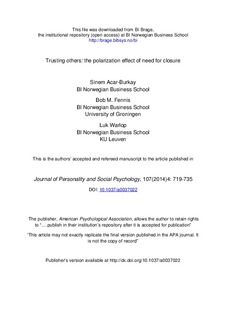Trusting others: The polarization effect of need for closure
Journal article, Peer reviewed
Permanent lenke
http://hdl.handle.net/11250/225717Utgivelsesdato
2014Metadata
Vis full innførselSamlinger
- Publikasjoner fra CRIStin - BI [1015]
- Scientific articles [2181]
Sammendrag
Because trust-related issues inherently involve uncertainty, we expected individuals’ social-cognitive
motivation to manage uncertainty—which is captured by their need for closure—to influence their level
of trust in others. Through the results of 6 studies, we showed that higher need for closure was related
to more polarized trust judgments (i.e., low trust in distant others and high trust in close others) in the
case of both chronic and situational need for closure. Moreover, participants with high need for closure
did not revise their level of trust when they received feedback about the trustees’ actual trustworthiness,
whereas participants with low need for closure did. Overall, our findings indicate that polarized (either
high or low, as opposed to moderate) and persistent levels of trust may serve people’s seizing and
freezing needs for achieving cognitive closure.
Keywords: need for closure, trust, uncertainty, interpersonal closeness
Beskrivelse
This is the authors’ accepted and refereed manuscript to the article
